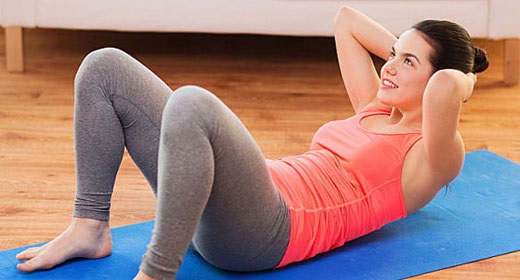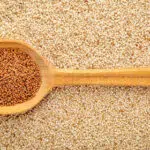We all could use a better night’s sleep…
It’s very rare that anybody in this day and age wakes up in the morning feeling completely awake and well rested. If you’re having trouble falling asleep or staying asleep, the tips on this list could help you get those much needed hours of REM sleep.
Keep reading to find out which supplements you can take to help with jet lag, when you should be exercising, and why you should stop taking naps (sorry, nap lovers).
Stay Away From Blue Light
Your body is very sensitive to light, so when you expose your eyes to bright light from a computer or phone screen, your body thinks it’s still daytime. Your body then doesn’t produce enough sleep hormones like melatonin to help you fall asleep.
Stop looking at screens at least two hours before you go to bed. Also, you can download apps like f.lux that will reduce the blue light that emanates from your screen at nighttime.
Get Enough Sunlight During The Day

Your body has a natural idea of when you’re supposed to be awake and when you’re supposed to be asleep known as your circadian rhythm. That circadian rhythm is regulated by hormones which are in turn regulated by exposure to light.
If you get a lot of sunlight or just light exposure during the day, you’ll feel more awake and energized. When you’re more energized during the day, you’ll have a better night’s sleep.
Reduce Your Caffeine Intake, Especially Late In The Day

Caffeine has numerous health benefits when taken in moderation. If you drink coffee or a similar source of caffeine late in the day, that caffeine will stimulate your nervous system and may stop you from relaxing at night.
Caffeine can stay in your bloodstream for 6-8 hours, so you really shouldn’t be drinking coffee after about 3 or 4 PM depending on when you want to go to sleep. Stick to decaf in the afternoon.
Read on to find out which natural supplement can help you sleep better.
Stop Napping

Short power naps can be okay every now and again, but all too often those short power naps turn into naps of several hours. Sleeping during the day can really mess with your circadian rhythm and it may make it more difficult for you to fall asleep at night.
If you’re a person who can sleep for thirty minutes during the day and not feel groggy afterward, you keep doing you, but if you know your power nap is going to last a long time, then just go to sleep earlier at night.
Be Consistent With Your Sleep

Try to wake up and go to sleep at the same time every day. This will majorly help your body’s ability to regulate itself when it comes to sleep rhythms.
Try to get into the habit of waking up when your alarm goes off, even on the weekends. After a while, you might not even need to set an alarm. Your body will just know to get up at the same time every day. It will also know to go to sleep at the same time every day.
Take A Melatonin Supplement

Your body makes a hormone called melatonin all on its own. It’s this hormone that tells your body when it’s time to go to sleep. If you’re having trouble sleeping, you can take a melatonin supplement. These supplements are especially helpful if you’re having trouble getting over jet lag.
You should check with a medical professional before you use melatonin, though, and be very careful when considering giving it to children. Effects of melatonin on children haven’t been well studied yet.
There Are Other Supplements To Consider

There are several other supplements that you can take if you need a little extra boost getting a good night’s sleep. Ginkgo biloba is a natural herb that may help you relax before bed. Magnesium can also improve relaxation and sleep quality.
Lavender (pictured above) has been shown to have relaxing qualities. You can ingest lavender in pill form, or you can breathe in some lavender essential oil before bed. You can put that stuff right on your pillow.
Keep reading to find out what the optimal sleeping temperature is.
Don’t Drink Alcohol

Alcohol can have a negative effect on your body’s ability to regulate sleep hormones. Alcohol is a downer and it can alter melatonin production. It may make you feel sleepy, but that artificial sleepy feeling confuses your body.
If you use alcohol to go to sleep, your body can become dependant on it, which brings up a whole bunch of other problems. Alcohol can also spike your human growth hormone which is not great if you want to get a good night’s sleep.
Turn Your Bedroom Into A Relaxing Oasis

Your sleeping environment has a huge impact on your quality of sleep. Make sure that your furniture is arranged in a way that makes sense. Reduce external noise and light by investing in some good quality blinds.
You might want to cover your bright alarm clocks or get an analog alarm clock that doesn’t emit much light. Make sure your bedroom is generally clean and inviting. You won’t have a good night’s sleep if there’s a pile of unfolded laundry at the foot of your bed.
Keep It Cool

Your body temperature and the temperature of the environment around you can profoundly affect your sleep. It can be very difficult to fall asleep or get a good night’s sleep if the temperature in your bedroom is too warm.
70 degrees Fahrenheit (or 20 degrees Celcius) seems to be the ideal sleeping temperature for most people. Temperature can actually affect your sleep more than external noise, so you definitely want to make sure that thermostat is adjusted.
Don’t Eat Late At Night

Late-night snacking can take a real toll on your sleep habits and your quality of sleep. Food causes our body to release certain hormones, and those hormones may interfere with natural melatonin production.
High carb late night snacks are especially detrimental to sleep. Stop eating four hours before you want to go to bed. Don’t start opening that refrigerator door at 9 PM looking for snacks. You know there’s nothing in there that you want, anyway.
Relax And Clear Your Mind In The Evening

A relaxing pre-sleep routine can really help you wind down before bed. You can tailor your pre-sleep routine to whatever is relaxing to you. Some people listen to relaxing music, read a book, take a hot bath, meditate, or just breathe deeply.
You can try out a bunch of different methods until you find a routine that works for you. Sometimes a relaxing massage from a friend or a partner can do the trick.
Keep reading to find out how often you should be replacing your mattress.
Take A Bath Or A Shower Before Bed

It’s a good idea to make taking a relaxing bath or shower part of your pre-sleep routine. Studies have shown that taking a hot bath 90 minutes before bed actually improved sleep quality and helped people get a deeper sleep.
If you don’t feel like soaking your whole body in a tub, you could just put your feet into a warm bath. Dim the lights, light a candle, and you’re good to go.
Rule Out A Sleep Disorder

Sometimes an inability to get enough sleep or to get a deep enough sleep could be caused by something more serious than getting too much screen time or waking up late on the weekends.
If you’re really having trouble sleeping, you could have a sleep disorder like insomnia or sleep apnea. The only way to know for sure is to see a doctor and do a sleep study (which is when you sleep in a lab with a bunch of wires attached to you).
Get Comfy

The quality of your mattress, your bed, and your pillow can have a huge impact on your quality of sleep. If you find that you always sleep better in a hotel room, it might be time to invest in a new mattress.
Mattresses can degrade over time. If you haven’t replaced your bedding in a long time, it might be time to do you. You really should update your bedding every five to eight years.
Exercise During The Day (But Not Before Bed)

Exercise is a proven way to enhance the quality of your sleep. It can reduce symptoms of insomnia, help you get a deeper sleep, and help you fall asleep faster. Daily exercise is the best thing you can do for your circadian rhythm and the best thing you can do for your overall health.
If you exercise too late in the day though, your body can get confused and release hormones that keep you alert like adrenaline and epinephrine. It’s best to exercise in the morning or the afternoon, not too late in the evening.
Don’t Drink Liquids Late At Night

Nocturia is the medical term for excessive urination at nighttime. If you’re constantly waking up to go to the washroom, you really aren’t getting a night of good, uninterrupted sleep.
Hydration is vital for your health, so you want to get all of those fluids earlier in the day. If you usually have to get up in the middle of the night to go to the bathroom, stop drinking an hour or two before you go to bed. Also, make sure you use the washroom right before you go to sleep.
Stop Smoking

Nicotine is very similar to caffeine in that it messes with your circadian rhythm and it can keep you up at night. If you’re a smoker, quitting smoking is the best thing you can do for your health and for your quality of sleep.
Smoking and tobacco have been linked to lung cancer and chronic pulmonary disease. In the United States alone, about 500,000 deaths per year are due to smoking-related diseases.
Keep Your Work Out Of Your Bed

If you work from home, it can be tempting to work from your bed or your bedroom. The thing is, if you work in bed, you’re going to associate your bed with work and not sleep. Create a clear distinction between workspace and sleep space.
Set up your laptop in your living room or at your kitchen table if you don’t have a desk or a workspace. Try not to bring your laptop into your bed.
Sorry Fido, No Pets Allowed

You really shouldn’t let your pets into your bed for a variety of reasons. Some of them are for your pet’s benefit and some of them are for your benefit. How can you really get a good night’s sleep when you’re trying to maneuver your legs around a giant sleepy Labrador?
Get your dog his own bed. You’ll both sleep better and your bed won’t be full of dog fur.

















































